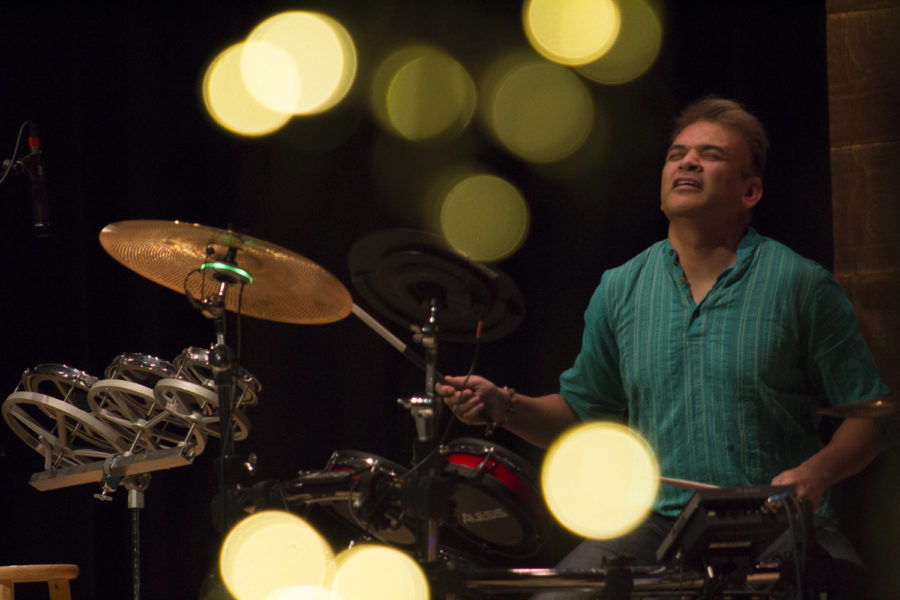Behind the scenes: Indian Students’ Association hosts Diwali
Kennedy DeRaedt/Iowa State Daily
The band Dhun performs in the Great Hall of the Memorial Union. Dhun is an Indian music band based out of Des Moines. Diwali Night was hosted by the Indian Students Association on Nov. 11 in the Memorial Union. People were invited to enjoy the Festival of Lights with music, dance, handicrafts, games and Indian food.
November 13, 2018
While Diwali is a far-reaching cultural celebration for many students at Iowa State, the significance behind the event’s success it not as well known, nor is the immersive organization that makes this and so many other events possible each year.
The Indian Students’ Association, one of the largest student organizations on campus, orchestrates some of the most favored events by Iowa State Yash Solanki and Rahul Namboori, president and public relations officer, respectively, stress that the organization has two main jobs for its members. They not only serve as a community for current Indian students; they also help out new Indian students coming into the university.
“We give them advice on what people usually do, what people usually bring with them to college,” Solanki said. “For some of them, since dorms don’t become available till a few weeks into the summer break or closer to when college is starting, we arrange for people who are, like, currently staying here to host them for a few weeks.”
Solanki also explains how the organization, “serves as a bridge between Indians and non-Indians.” This way, everyone can take part in Indian festivals. Those from India can have a piece of their lives from back home at Iowa State, while those unfamiliar with Indian culture can take part in the enjoyment.
The Indian Students’ Association has seen a significant increase as well in its membership and event popularity. Both Indians and non-Indians have been seen coming to events, increasing diversity.
Solanki articulated the new changes made to Diwali night, specifically. Solanki was part of the committee last year to showcase different arts with Indian culture, such as henna tattoos. Namboori also added how the organization has increased its lineup with outside performers rather than just simply student organizations. From adding student bands to outside organizations to new Indian catering services, ISA makes an effort to refashion the experience each year to add to the event’s appeal. The group also made a point to reach out to other student groups, such as the Freshman Honors Program.
Whether it’s creating more intricate decorations or finding new Indian restaurants, “Our main focus is always going one step above what it was last year,” Solanki said.
India is made up many different states, increasing the diversity of the country’s celebrations and cultural practices. However, Diwali is the one festival that brings these varied beliefs together through a sense of community and purpose.
“It moved away from a religious festival to basically a celebration of community,” Solanki said.
Solanki compares Diwali to Christmas-many people celebrate the holiday regardless of religion. Due to Diwali’s popularity among the expanse of world cultures in recent years, it’s no wonder why the festival found roots here at Iowa State.
“It basically becomes the most significant festival celebrated in Indian,” Solanki said.
Hindu Yuva additionally contributes to the success of Diwali through volunteering, hosting and performing during the festival.
The ISA features a traditional cultural showcase as well each year to raise money. This year the Indian Students’ Association raised around $3,000 in funds towards flood relief in Kerala, India. ISA also puts on Dandiya and Bollywood Dance Party, both of which are community dance events. Bollywood Dance Party is typically held around dead week as a energetic outlet for stress.
Their second biggest event, Holi, is held each spring. The festival of colors is a symbol of love and diversity, bringing together those who may not always be equal in the eyes of the world.
To make Diwali a reality each year, ISA starts planning at the beginning of the semester. The organization eventually meets every day the weeks leading up to the culmination of this celebration as they work out the minute details. With 16 people on the committee, everyone pitches for hours each day to coordinate with the various performers.
This year, Diwali sold out for the first time with 630 expected attendees. This year, the public relations officers have been much more involved. During past semesters, Diwali was a free showcase of Indian culture and community. The Indian Students’ Association ramped up outreach and publicity this year through enhancements in the ease of access with tickets. The organization notably opened up ticket sales online, but also in the days leading up to the event unlike previous years.
“Also we have our officers personally going out and personally talking to each member. That helped us get all these 630 tickets,” Namboori said.
Because many community members were disappointed with the event’s sell-out status, the ISA is looking into a larger venue to host Diwali in the upcoming year.
Solanki explains that reaching out is a large part of Diwali’s popularity, as well as making them aware of the event itself. Through multiple avenues of social media this year, ISA has transformed the way both students and the general public have access to the organization’s event information.
For those who don’t identify as Indian, Diwali is more than just a religious festival for its participants.
“The major portion of Diwali that is celebrated in India is essentially just a community celebration, so people … will be out bursting firecrackers so the sky is always lit up, Solanki said.
“It’s just a general time of the year where people just sort of take a break from work and just celebrate.”
















